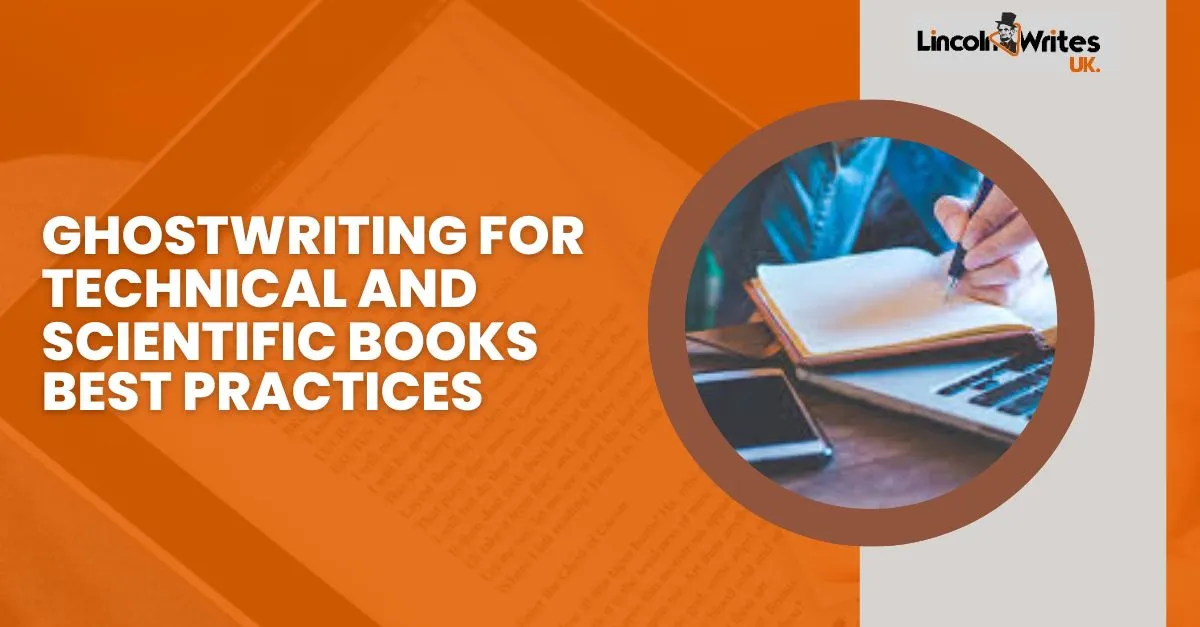Being part of a complex scientific, academic or technical field is no small feat. And writing a book on it, well… that’s something only a few can do. But what if you do want to produce your findings into a book, but don’t have the time for it? Welcome to the world of technical ghostwriting, where clarity meets complexity, and subject-matter expertise has to shine without losing the author’s voice.
If you’re a scientist, researcher, or thought leader with a wealth of knowledge but limited time (or writing confidence), partnering with a ghostwriter can be a game-changer. But not just any ghostwriter will do. It takes a unique blend of curiosity, research skill, and communication finesse to make complex information readable and market-ready.
In this post, we’ll break down how these professional ghostwriting services approach technical books, what best practices ensure quality and clarity, and how to protect both your content and your credibility.
What Makes Technical Ghostwriting Different?
Unlike narrative nonfiction or fiction writing, technical ghostwriting demands more than storytelling skills. Ghostwriters in this space must be:
- Research-savvy, often reading academic journals, white papers, or proprietary data
- Terminology fluent, able to learn the language of a new field quickly
- Accuracy-focused, because there’s no room for factual slip-ups
- Audience-aware, able to simplify concepts without “dumbing them down”
- Collaboration-friendly, since they’ll work closely with the subject-matter expert
This isn’t just writing, it’s an entirely different skillset. You’re taking complex material and turning it into a compelling, digestible manuscript for a general or semi-specialist audience. And you’re doing it in a way that still preserves authenticity in ghostwriting, the author’s tone, style, and professional reputation.
Best Practices for Ghostwriting Technical and Scientific Content
If you want to become a pro in writing technical books, that take a page from an experts technical ghostwriters book and consistently work on these parts of the writing process:
1. Start With a Deep Dive Discovery Phase
Before typing a single word, a technical ghostwriter needs to understand:
- What the book is about
- Who the target audience is
- What problem does it solve
- How deep does the content need to go
This usually involves:
- Recorded interviews
- Reviewing slide decks or published work
- Reading foundational texts on the subject
- Clarifying goals for tone (academic, conversational, etc.)
A successful kickoff sets the tone for the rest of the project. It’s also crucial when setting expectations in collaborative writing vs ghostwriting arrangements, especially when the client wants to stay heavily involved.
2. Structure Is Everything
Technical books often carry a heavier load of information, so structure becomes your best friend.
Use:
- Logical chapter breakdowns
- Summary sections
- Case studies or real-world examples
- Diagrams or visual explanations (if applicable)
Whether you’re ghostwriting a cybersecurity guide or a medical research primer, the ability to prepare a manuscript for ebook readability is just as important as the writing itself. Formatting tools and visual cues will help readers stay engaged and not get lost in jargon.
3. Simplify Without Oversimplifying
This is the tightrope walk. Technical ghostwriters must:
- Avoid jargon where possible
- Define terms when necessary
- Use analogies or metaphors to explain difficult concepts
- Maintain the integrity of the original data
It’s like being a children’s book ghostwriter for adults, you’re breaking down complexity into understandable chunks, while still keeping it smart, professional, and true to the source.
4. Verify, Then Verify Again
Accuracy is non-negotiable.
Professional ghostwriting services employ fact-checking practices, source citations, and sometimes even consult third-party experts. The ghostwriter should never assume. They ask, research, and confirm.
Any use of case studies, statistics, or research data should come with proper sourcing. This becomes especially important when clients are bound by academic standards or industry regulations.
Remember: technical mistakes erode trust fast. Avoid them by integrating the importance of proofreading at every step.
5. Incorporate the Author’s Voice
This is where authenticity in ghostwriting really matters.
Even if the ghostwriter is doing 90% of the heavy lifting, the book still needs to feel like the author wrote it. This includes:
- Matching their tone (formal, witty, no-nonsense, reflective)
- Including personal anecdotes or professional experiences
- Using the terminology the author frequently uses in conversation
- Getting feedback on voice in early chapters
In long-term projects, such as ghostwritten series planning, this voice consistency becomes even more important.
6. Avoid Common Pitfalls
Even the best technical ghostwriters can fall into these traps:
- Over-explaining simple concepts for a professional audience
- Under-explaining for general readers
- Using filler language to pad out chapters
- Assuming the reader has the same background as the author
Stay on guard. Clear, concise writing beats padded content every time.
Editing and Proofing- Not Just a Final Step
Once the manuscript is drafted, editing for clarity and proofreading for accuracy must be treated like part of the writing process, not an afterthought.
This includes:
- Checking for common grammar mistakes that may slip into technical writing
- Understanding the differences between proofreading ebooks vs print
- Knowing when to choose the right proofreader for technical material
- Deciding on human vs AI proofreading (spoiler: human wins, especially with nuance)
If the final product will be published digitally, ensure that eBook metadata optimisation is also handled correctly. A great book description and keywords can make a huge difference in visibility.
Legal and Ethical Considerations
Ghostwriting scientific or technical content can sometimes toe legal lines, especially if the ghostwriter is interpreting data or making claims.
Best practices include:
- Clearly outlining roles in the ghostwriting contract
- Making sure the final manuscript is reviewed and signed off by the credited author
- Maintaining confidentiality around proprietary or unpublished research
Ethical ghostwriting services also know when to step back. If a topic is too far outside their wheelhouse or if the author is unwilling to collaborate meaningfully, it may not be the right fit.
Watch Out for Publishing Pitfalls
Authors new to technical publishing can fall prey to shady practices. Be aware of:
- Ebook publishing scams that charge high fees for minimal return
- Vague or misleading royalty structures (always evaluate ebook publishing contract terms carefully)
- Vanity publishers disguised as traditional imprints
This is especially important for professionals hoping to publish with the top ebook publishers UK or who plan to distribute across major platforms. A reputable ghostwriting and publishing team will help you spot red flags early.
Final Note
Technical ghostwriting is a specialist craft that merges deep research with accessible storytelling. Done well, it gives subject-matter experts a powerful platform without sacrificing clarity, accuracy, or authenticity.
Whether you’re a medical expert, cybersecurity consultant, AI researcher, or startup founder, your knowledge deserves to be shared. And with the right ghostwriter, it can be translated into a book that informs, inspires, and influences.
At Lincoln Writes UK, our ghostwriting services include everything from one-off guides to multi-book strategies, always anchored in clarity and collaboration. We work closely with clients to protect their voice, polish their message, and get their ideas in front of the right readers.
Need help outlining your next book? Or want to see how ghostwriting might fit your publishing goals? Let’s talk, we’ll help you build something brilliant, one accurate sentence at a time.


